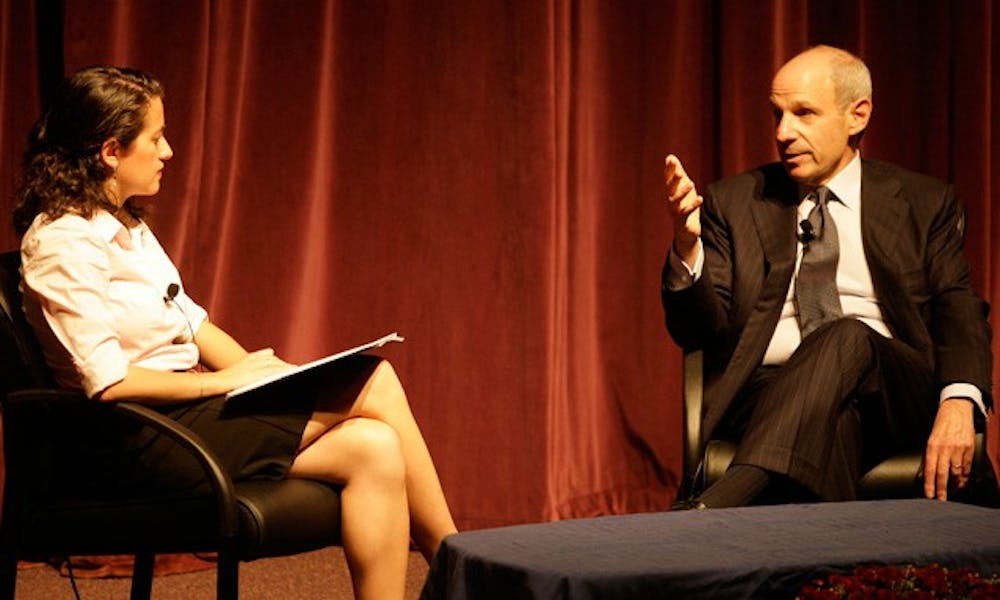The scope of “social action” is widening, according to Jonathan Tisch, who discussed the need for engagement and corporate responsibility Tuesday afternoon.
Tisch—chief executive officer of Loews Hotels, owner of the New York Giants and an author—is a national leader in philanthropy, social action and business and community partnerships. He spoke with Duke Partnership for Service President Becky Agostino, a senior, and an audience of about 100 students and faculty members in Griffith Film Theater.
“Service is exemplified by everything Mr. Tisch does... by direct focus on engagement,” Vice President for Student Affairs Larry Moneta said. “This is a person for whom ‘service’ is truly the right word.”
Tisch became involved in issues pertaining to social action after noticing that many of America’s corporate business practices have recently not been viewed favorably. Tisch said this bad reputation was what inspired him to write his first book, the bestselling “The Power of We: Succeeding Through Partnerships,” which was published in 2004.
After Agostino asked Tisch questions, members of the audience were invited to ask Tisch about social entrepreneurship and his third and most recent book, “Citizen You: Doing Your Part to Change the World.”
Tisch said “Citizen You,” which came out in May, was reflective of the “important moment [we are in] as a society.” He noted that the challenges that the world faces today, such as natural and man-made disasters and political instability can be hard to confront.
“We as a people can truly be overwhelmed,” he said.
Tisch added that he hopes the book will be a guide for people to realize how they can use their own expertise to become a “citizen lawyer, a citizen doctor, a citizen teacher” in the community.
Tisch also noted that social entrepreneurship is more important and functions differently in society today because the world is a different place than it was when he was young.
“[When I was growing up] I always thought that there would be clean water for everyone... we thought the resources were endless,” Tisch said.
Because certain social issues have become more pressing, Tisch said younger people have become more engaged in these issues. He noted that his stepdaughter, although only in second grade, has been doing community service in school since kindergarten. Additionally, students at Tufts University—Tisch’s alma mater—can take courses on how to become an active, engaged citizen. Tisch is also the benefactor of the Jonathan M. Tisch College of Citizenship and Public Service at Tufts.
Still, Tisch noted that it is important to make the next generation embrace service. He added that his books do not just address the business community, but that they are applicable to numerous fields.
“The book resonated with a lot of different people,” Tisch said.
Another way in which the field of service has changed since Tisch was growing up is whose responsibility it is to organize social services. Traditionally, government has had a large role in encouraging social entrepreneurship but with the economic downturn, more responsibility has fallen on the private sector, Tisch said.
Tisch also urged his audience to be leaders in social entrepreneurship.
“The message will be delivered by you and your passion,” he said. “When you find an issue that’s important to you... you should go out and try to engage others.... Don’t ever lose that passion.”
Members of the audience were generally receptive to Tisch’s message.
“I personally am really interested in service issues,” said sophomore Tori Wilmarth. “Mr. Tisch has a very unique perspective.... I think he had some interesting perspectives about other ways to think of service.”
Elizabeth Linzer, T ’09 and program manager for the Entrepreneurial Leadership Initiative, a part of the Hart Leadership Program in the Sanford School of Public Policy, said she thought the talk was great.
“These [issues of corporate responsibility] are really important topics for undergraduates to be exposed to, and for us to be talking about and understanding better,” Linzer said.
Tisch also has personal connections to Duke, which he noted at the end of the event. His father was treated for brain tumors at Duke Hospital, and Tisch said he wanted to thank the “incredible individuals” who took care of his father, many of whom were in attendance.
Agostino finished the event by asking Tisch about his upcoming plans. Tisch responded that although he is unsure what the future may hold for him, his past successes have had a common denominator.
“I’m surrounded by really good people,” he said. “I couldn’t do any of it by myself.”
Get The Chronicle straight to your inbox
Signup for our weekly newsletter. Cancel at any time.

